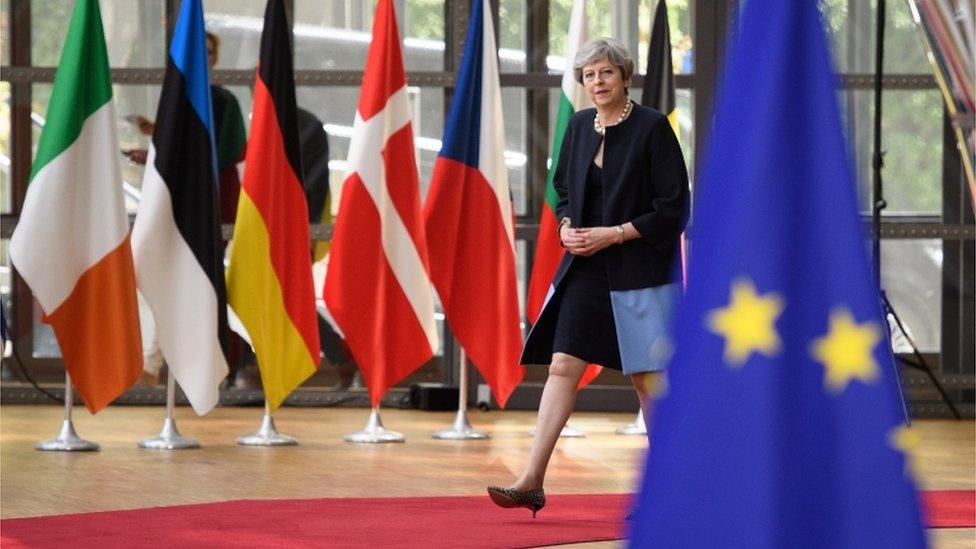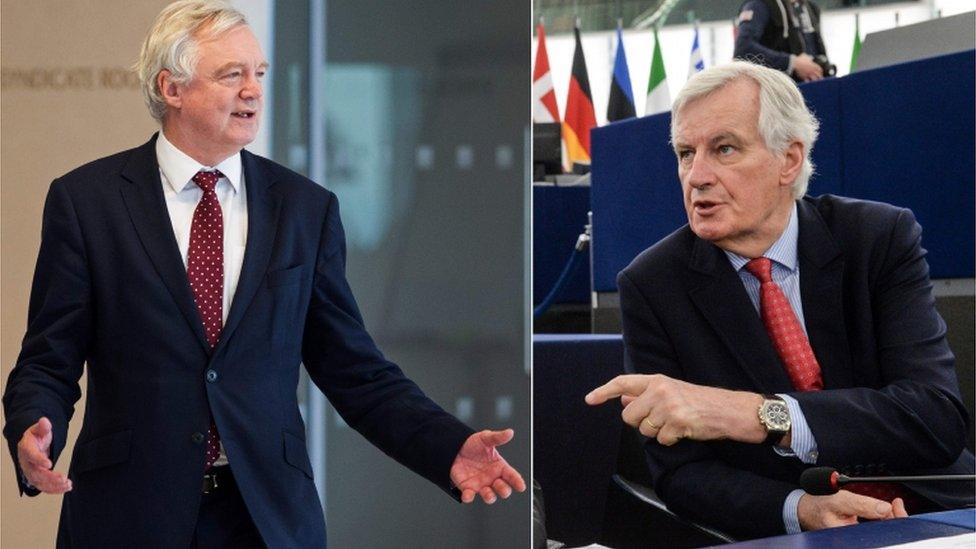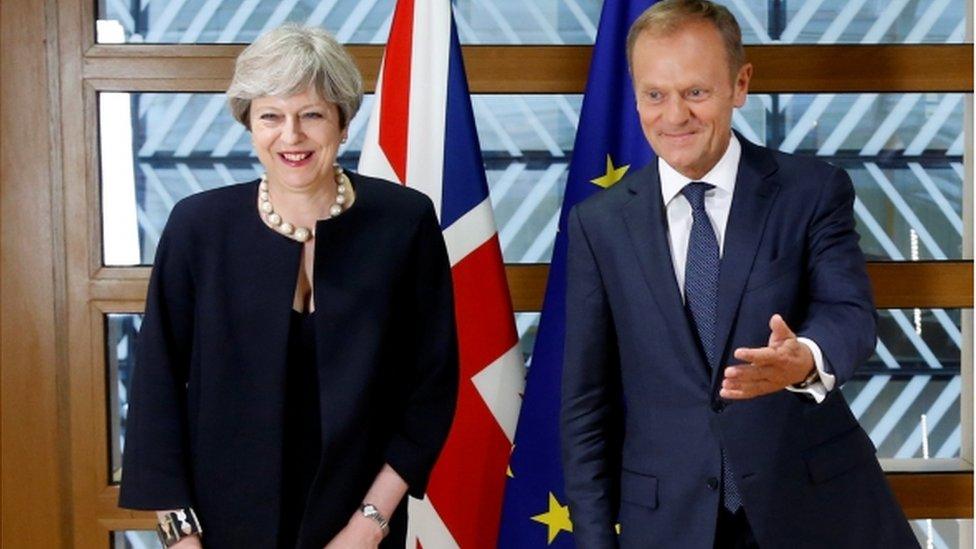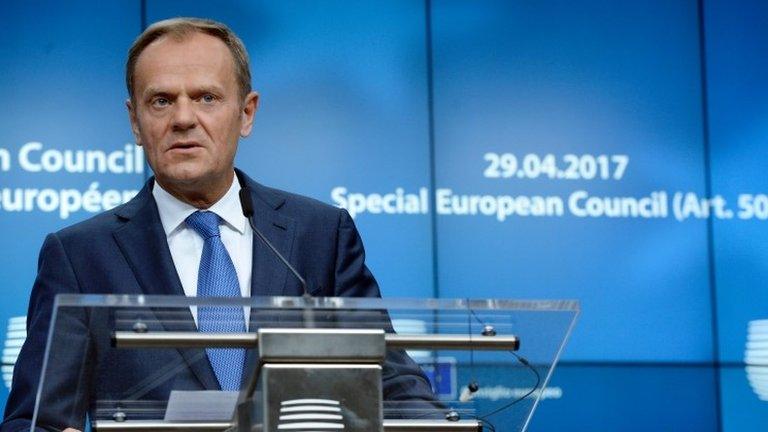Brexit: David Davis 'pretty sure' of free trade deal
- Published
"Very French": What David Davis thinks of his EU counterpart
Brexit Secretary David Davis has told the BBC he is "pretty sure", but not "certain", that he will be able to get a free trade deal with the EU.
He told BBC One's Andrew Marr Show that other EU states "have a very strong interest in getting a good deal".
But he said that if the UK was only offered a "punishment deal" then it had to be prepared to "walk away".
His Labour shadow Sir Keir Starmer said Mr Davis should focus on getting the best deal, not "preparing for failure".
In his interview, Mr Davis also defended Theresa May as a "very good prime minister" - although said she was "under pressure".
When asked if it would be "catastrophic" for Brexit negotiations for there to be a Tory leadership contest, he replied: "Yes."
"Let me be absolutely plain about this, number one, I happen to think we have got a very good prime minister. I know she is coming under a lot of pressure at the moment, but I have seen her in action.
"I think she is very good. She makes good decisions. She's bold. She takes her time.
"Point number two is, I want a stable backdrop to this Brexit negotiation."
'No deal'
Mr Davis is heading up the UK side of negotiations, and began talks last week with his EU counterpart Michel Barnier. Of Mr Barnier, he said: "He wants a deal as much as we want a deal, I think."
Mrs May has been criticised by some for saying "no deal is better than a bad deal" with the EU.

Mrs May has been under pressure since losing her Commons majority in the general election
Last week, Chancellor Philip Hammond said "no deal would be a very, very bad outcome for Britain" although he went on to say a "worse outcome" would be a deal "deliberately structured to suck the lifeblood out of our economy".
When Mr Davis was asked by Marr whether he was sure there would be a deal, he said: "I'm pretty sure, I am not 100% sure, you can never be, it's a negotiation.
Reminded of his past words that "we are guaranteed to get a deal", Mr Davis said: "You can be sure there will be a deal, whether it's the deal I want which is the free trade agreement, the customs agreement and so on - I'm pretty sure but I'm not certain."
On the prospect of no deal, he said a bad deal "would be better than a punishment deal".
"We cannot have a circumstance where the other side says that they are going to punish you. So if that happens then there is a walkaway, and we have to plan for that."

Mr Davis and EU chief negotiator Mr Barnier began talks last week
Mr Davis said he wanted to deliver an outcome "which helps both sides" and said it was likely there would be a transitional period, after the UK leaves the EU, for trade arrangements, probably of "one to two years".
Sir Keir Starmer, shadow secretary of state for exiting the EU, said "no deal is not a viable option as it would be catastrophic for British trade, jobs and security. The sooner David Davis realises this, the better.
"Instead of preparing for failure the government should be putting all their efforts into getting a Brexit deal that works for Britain - that means putting jobs and the economy first and dropping the no deal mantra."
Mr Davis also said he wanted to get a deal on the rights of EU citizens in the UK, and UK citizens living in other EU states, "through now" and to discuss the issue of how the border between Northern Ireland and the Irish Republic will operate, although he acknowledged that it would not be concluded in the negotiations this summer.
'Not good enough'
He said the government wanted to have an "invisible border" between Northern Ireland and the Irish Republic and said there was lots of "technical stuff" to start working on now - such as number plate recognition and "trusted trailer schemes".
But the Liberal Democrats' Brexit spokesman, Tom Brake, said Mr Davis "inspires about as much confidence as a drunken trapeze artist".
"It is the country as a whole that will suffer when he comes crashing to the floor.
"These negotiations will affect our lives for decades, but he's only 'pretty sure' of getting a deal. It is simply not good enough."
'Pragmatic'
Meanwhile Shadow Cabinet Office minister Jon Trickett has been asked to clarify Labour's position on the single market after 50 Labour politicians signed a letter to the Guardian, external urging the party to back staying in.
Shadow Chancellor John McDonnell has previously said he did not think remaining a member of the single market was "feasible" and Mr Corbyn has suggested Brexit would mean an end to the UK's single market membership.
Mr Trickett told BBC One's Sunday Politics that while Labour's position is to "have access to all of the tariff-free arrangements which exist within the customs union and single market" it was not wedded to any "particular institutional form".
He said: "We are pragmatic about it. Let's see how the negotiations go. We are not going to say one thing or another in terms of institutional relationships."
The prime minister has said the UK "cannot possibly" remain in the single market as to do so would mean "not leaving the EU at all".
EU leaders have warned that the UK cannot access the single market, which allows the free movement of goods, services and workers between its members, while at the same time restricting the free movement of people.
- Published22 June 2017

- Published29 April 2017
